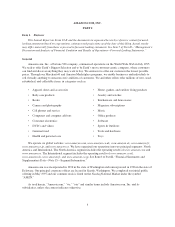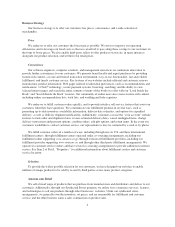Amazon.com 2003 Annual Report Download - page 17
Download and view the complete annual report
Please find page 17 of the 2003 Amazon.com annual report below. You can navigate through the pages in the report by either clicking on the pages listed below, or by using the keyword search tool below to find specific information within the annual report.We Have Foreign Exchange Risk
The results of operations and certain of our intercompany balances associated with our internationally-
focused websites are exposed to foreign exchange rate fluctuations. Upon translation, net sales and other
operating results may differ materially from expectations, and we may record significant transaction gains or
losses on the remeasurement of intercompany balances.
In addition, our 6.875% Convertible Subordinated Notes due 2010 (“6.875% PEACS”) are denominated in
Euros, not U.S. Dollars. We remeasure the principal of the 6.875% PEACS quarterly based on fluctuations in the
Euro/U.S. Dollar exchange ratio and record gains or losses in “Remeasurement of 6.875% PEACS and other” on
our consolidated statements of operations. Furthermore, we hold cash equivalents and marketable securities in
Euros, British Pounds and Yen. Accordingly, if the U.S. Dollar strengthens compared to these currencies, cash
equivalents and marketable securities balances, when translated, may be materially less than expected and vice
versa.
Our Planned Future Growth Will Place a Significant Strain on our Management, Operational, and
Financial Resources
We have rapidly and significantly expanded our operations and will endeavor to expand further to pursue
growth of our product and service offerings and customer base. Such growth will continue to place a significant
strain on our management, operational, and financial resources. We also need to hire, train, and manage our
employee base. Our current and planned personnel, systems, procedures, and controls may not be adequate to
support and effectively manage our future operations, especially as we employ personnel in multiple geographic
locations. We may not be able to hire, train, retain, motivate, and manage required personnel, which may limit
our growth.
In addition, we do not expect to benefit in our newer market segments from the first-to-market advantage
that we experienced in the online book channel. Our gross profits in our newer business activities may be lower
than in our older business activities. In addition, we may have limited or no experience in new product and
service activities and our customers may not favorably receive our new businesses. To the extent we pursue
commercial agreements and/or strategic alliances to facilitate new product or service activities, the agreements
and/or alliances may not be successful. If any of this were to occur, it could damage our reputation and
negatively affect revenue growth.
The Loss of Key Senior Management Personnel Could Negatively Affect Our Business
We depend on the continued services and performance of our senior management and other key personnel,
particularly Jeffrey P. Bezos, our President, Chief Executive Officer, and Chairman of the Board. We do not have
“key person” life insurance policies. The loss of any of our executive officers or other key employees could harm
our business.
System Interruption and the Lack of Integration and Redundancy in Our Systems May Affect Our Sales
Customer access to our websites directly affects the volume of goods we sell and the services we offer and
thus affects our net sales. We experience occasional system interruptions that make our websites unavailable or
prevent us from efficiently fulfilling orders or providing services to third parties, which may reduce our net sales
and the attractiveness of our products and services. If we are unable to continually add additional software and
hardware and upgrade in an effective manner our systems and network infrastructure, it could cause system
interruption and adversely affect our operating results.
Our computer and communications systems and operations could be damaged or interrupted by fire, flood,
power loss, telecommunications failure, earthquakes, acts of war or terrorism, acts of God, computer viruses,
physical or electronic break-ins, and similar events or disruptions. Any of these events could cause system
interruption, delays, and loss of critical data, and could prevent us from accepting and fulfilling customer orders.
11
























